The future of healthcare is rapidly changing and on the cusp of a technological revolution. Healthcare providers are pressured to reduce costs and increase patient satisfaction while also improving the quality of care. The only way they can do this is by adopting next-generation technologies that tap into the advancements in data sharing and connectivity. From Artificial Intelligence (AI), analytics, and cloud services to the Internet of Things (IoT) and Robotic Process Automation (RPA), these innovations have the potential to change how healthcare is provided to patients.
But what exactly does this mean? What kind of next-generation technologies in healthcare are we talking about? And how do they affect patients, providers, and payers? In this blog post, we will discuss next-generation technologies and their impact on healthcare today as well as tomorrow.
Table of Contents
1. Artificial Intelligence
AI has played a critical role in several industries, only recently taking a leading role in healthcare. According to a report by McKinsey, healthcare is one of the top five industries with more than 50 use cases involving AI. The application of AI enables healthcare organizations to boost efficiency and streamline daily functions. With AI, healthcare providers can employ intelligent algorithms and powerful tools to analyze large databases of patient information and optimize the performance of hospitals. At the highest level, AI can be used for medical diagnostics, drug discovery, clinical trials, and improving patient outcomes.
2. Next-gen Cloud computing
In today’s digital world, there has been a massive shift in the generation, consumption, storage, and sharing of healthcare data. Although cloud computing has already been employed in healthcare, there has been a notable move from simple data storage to using healthcare clouds to lower costs and gain efficiencies. With this next-generation technology, healthcare providers benefit from interoperability and easy access to the patient data collated from numerous sources, they can share information with stakeholders, and issue timely prescriptions and treatment protocols. Cloud computing also enables telemedicine capabilities, post-hospitalization care plans, and virtual medication adherence. With the pandemic emphasizing the benefits of cloud computing, even those who were previously hesitant to move forward with cloud computing in healthcare are beginning to acknowledge its advantages.
3. Internet of Things
The Internet of Things offers many opportunities for healthcare providers to monitor patients, as well as for patients to monitor themselves. Healthcare devices represent one of the fastest-growing sectors of the IoT market. IoT-enabled devices have made remote monitoring in the healthcare sector possible, keeping patients safe and healthy, and empowering doctors to deliver superior care. Before IoT, doctor-patient engagement was limited only to visits and text communications, but IoT has increased patient engagement and satisfaction as interactions with doctors have become easier and more efficient. However, IoT implementation in healthcare is moving slowly and healthcare providers are yet to tap into the real potential of IoT in the healthcare industry.
4. Robotic Process Automation
The traditional healthcare ecosystem is burdened with endless paperwork and administrative tasks that require a substantial amount of resource allocation, leading to high costs for operations and slow processes. But with RPA, healthcare providers can make the healthcare systems more efficient and faster, improving patient satisfaction as a result. One of the critical areas where RPA is improving healthcare is claims management. RPA can automate time-intensive tasks and also eliminate human errors during processing. It can also help with regulatory compliance, as well as data migration from legacy systems to digital systems.
Next-generation technologies are changing healthcare. The future of healthcare will be based in large part on the innovations that are being developed today. Forecasts show that these advancements could save up to $150 billion annually in healthcare costs within ten years. With next-generation technologies in healthcare, it’s time for healthcare organizations to start preparing for a new era of care.
With over 15 years of experience working with some of the top healthcare organizations, Speridian has listened, learned, and created some of the most innovative healthcare solutions and delivery models that help our clients solve their problems and achieve their goals. Speridian’s healthcare expertise ranges from the latest next-generation technology services to process automation and optimization services to advanced healthcare consulting. By leveraging our deep relationships with leading technology vendors, like Oracle, Microsoft, Salesforce.com, and AWS, we help clients modernize their businesses through digital transformation.
